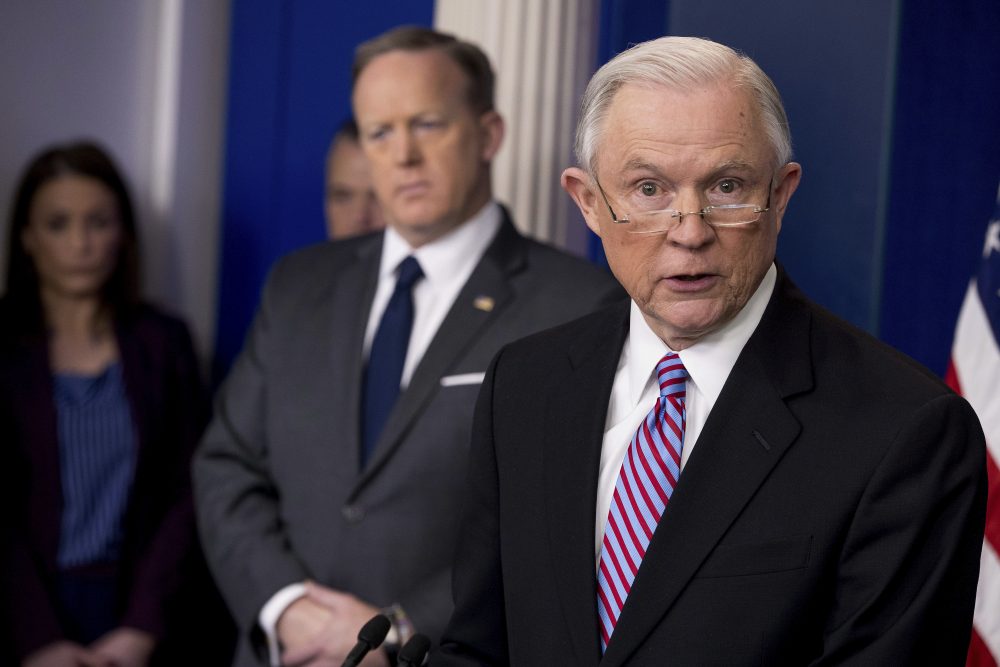Advertisement
Loss Of DOJ Funding Could Have 'Dramatic Impact' On Mass. Sanctuary Cities
Resume
Massachusetts communities are reacting to new pressure from the Trump administration on so-called "sanctuary cities" — jurisdictions that refuse to detain people solely based on their immigration status.
U.S. Attorney General Jeff Sessions on Monday detailed plans to withhold or "claw back" Department of Justice funding from cities and towns that do not fully cooperate with Immigration and Customs Enforcement agents.
"I hope the American people and their constituents in their own cities will communicate with [sanctuary city leaders], and as we continue a dialogue and a discussion, and as we continue to ensure that monies that go for law enforcement only go to cities who are participating in an effective, collegial, cooperative way with the federal government, that that would also send a message," Sessions said.
Sessions' announcement follows President Trump's January executive order that threatened to pull federal funding from sanctuary cities. There is no legal definition of a sanctuary city and the ordinances vary from town to town, but they generally limit the amount of cooperation and information provided by local law enforcement to federal immigration authorities. The president's executive order specifically mentions eliminating federal funding for "jurisdictions that willfully refuse to comply with" a particular federal code that says local governments may not restrict information to federal authorities regarding an individual's immigration status.
But some leaders in Massachusetts sanctuary cities say their policies do not prohibit cooperation with federal immigration authorities, rather they limit the amount of information collected by local police when it comes to immigration status. In other words, it's not a matter of refusing to cooperate but rather simply not having the information ICE officials may request.
The cities of Chelsea and Lawrence sued the Trump administration over the executive order, alleging it was "a major affront to basic principles of federalism and the separation of powers."
Chelsea City Manager Thomas Ambrosino says that case is currently proceeding as normal, but that could change if the federal government moves to pull funding from the city.
"I would expect that if there is an effort to actually take away funding from the city of Chelsea, we would seek some sort of emergency action by the federal court," he said.
Ambrosino says his city isn't violating any federal law in opting not to collect information about residents' immigration status.
He estimated that Chelsea has several million dollars at stake in funds from the Department of Justice.
"If the federal government sought to either withhold funds or try to claw back funds, that would have a dramatic impact on the city's finances," Ambrosino said.
The Boston City Council passed a Trust Act ordinance in 2014, ensuring that Boston Police would not perform federal immigration duties. Boston Mayor Marty Walsh was an early and outspoken opponent of Trump's executive order on sanctuary cities, and says this latest announcement is bad for communities.
“The safety and well-being of our residents is, and will continue to be, my top priority as Mayor of Boston," Walsh said in a statement. "The threat of cutting federal funding from cities across the country that aim to foster trusting relationships between their law enforcement and the immigrant community is irresponsible and destructive.”
Advertisement
Somerville also has a sanctuary city ordinance on the books. Mayor Joseph Curtatone said the message from Sessions is the same type of rhetoric that the Trump administration has used in the past.
"Sanctuary cities like Somerville are not breaking any existing federal laws. Somerville does not harbor any criminals and we are in regular communication with and cooperate, in the interest of public safety, with our federal agencies, including ICE," Curtatone said. "No one who commits a violent crime, a felony or serious crime gets a free pass here in Somerville."
Somerville was recently listed on a Department of Homeland Security report citing jurisdictions with policies that limit cooperation with ICE.
This article was originally published on March 27, 2017.
This segment aired on March 28, 2017.
